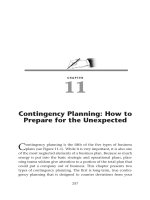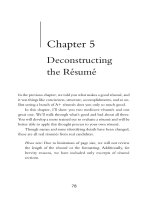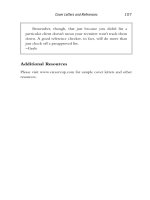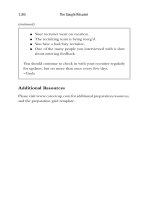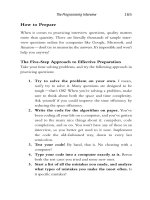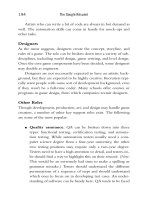The Google Resume How to Prepare for a Career and Land a Job at Apple Microsoft Google or any Top Tech Company_1 pdf
Bạn đang xem bản rút gọn của tài liệu. Xem và tải ngay bản đầy đủ của tài liệu tại đây (349.62 KB, 29 trang )
ffirs.indd iiffirs.indd ii 1/6/11 6:49:56 AM1/6/11 6:49:56 AM
ffirs.indd iffirs.indd i 1/6/11 6:49:55 AM1/6/11 6:49:55 AM
ffirs.indd iiffirs.indd ii 1/6/11 6:49:56 AM1/6/11 6:49:56 AM
How to Prepare for a Career
and Land a Job at Apple, Microsoft, Google,
or any Top Tech Company
Gayle Laakmann McDowell
John Wiley & Sons, Inc.
ffirs.indd iiiffirs.indd iii 1/6/11 6:49:56 AM1/6/11 6:49:56 AM
Copyright © 2011 by Gayle Laakmann. All rights reserved.
Published by John Wiley & Sons, Inc., Hoboken, New Jersey.
Published simultaneously in Canada.
No part of this publication may be reproduced, stored in a retrieval system, or transmitted
in any form or by any means, electronic, mechanical, photocopying, recording, scanning,
or otherwise, except as permitted under Section 107 or 108 of the 1976 United
States Copyright Act, without either the prior written permission of the Publisher, or
authorization through payment of the appropriate per-copy fee to the Copyright Clearance
Center, Inc., 222 Rosewood Drive, Danvers, MA 01923, (978) 750-8400, fax (978)
646-8600, or on the web at www.copyright.com. Requests to the Publisher for permission
should be addressed to the Permissions Department, John Wiley & Sons, Inc.,
111 River Street, Hoboken, NJ 07030, (201) 748-6011, fax (201) 748-6008, or online
at />Limit of Liability/Disclaimer of Warranty: While the publisher and author have used their
best efforts in preparing this book, they make no representations or warranties with respect
to the accuracy or completeness of the contents of this book and specifi cally disclaim any
implied warranties of merchantability or fi tness for a particular purpose. No warranty may
be created or extended by sales representatives or written sales materials. The advice and
strategies contained herein may not be suitable for your situation. You should consult with a
professional where appropriate. Neither the publisher nor author shall be liable for any loss
of profi t or any other commercial damages, including but not limited to special, incidental,
consequential, or other damages.
For general information on our other products and services or for technical support,
please contact our Customer Care Department within the United States at (800) 762-2974,
outside the United States at (317) 572-3993 or fax (317) 572-4002.
Wiley also publishes its books in a variety of electronic formats. Some content that appears
in print may not be available in electronic books. For more information about Wiley
products, visit our web site at www.wiley.com.
Library of Congress Cataloging-in-Publication Data:
McDowell, Gayle Laakmann, 1982-
The google résumé : how to prepare for a career and land a job at Apple, Microsoft,
Google, or any top tech company / Gayle Laakmann McDowell.
p. cm.
Includes index.
ISBN 978-0-470-92762-5 (hardback)
ISBN 978-1-118-01313-7 (ebk)
ISBN 978-1-118-01314-4 (ebk)
ISBN 978-1-118-01315-1 (ebk)
1. Résumés (Employment) 2. High technology industries—Vocational guidance.
3. Job hunting. I. Title.
HF5383.M335 2011
650.14'2—dc22
2010039906
Printed in the United States of America
10 9 8 7 6 5 4 3 2 1
ffirs.indd ivffirs.indd iv 1/6/11 6:49:57 AM1/6/11 6:49:57 AM
To my mother and grandmother,
whose engineering endeavors paved the way for my own.
ffirs.indd vffirs.indd v 1/6/11 6:49:57 AM1/6/11 6:49:57 AM
ffirs.indd viffirs.indd vi 1/6/11 6:49:57 AM1/6/11 6:49:57 AM
vii
Contents
Chapter 1 Introduction 1
Chapter 2 Advanced Preparation 15
Chapter 3 Getting in the Door 36
Chapter 4 Résumés 57
Chapter 5 Deconstructing the Résumé 78
Chapter 6 Cover Letters and References 89
Chapter 7 Interview Prep and Overview 108
Chapter 8 Interview Questions 137
Chapter 9 The Programming Interview 163
Chapter 10 Getting into Gaming 190
Chapter 11 The Offer 207
Chapter 12 On the Job 230
Chapter 13 Final Thoughts: Luck, Determination,
and What You Can Do 258
Appendix A 156 Action Words to Make
Your Résumé Jump 261
Appendix B Answers to Behavioral Interview Questions 265
Index 273
TOC.indd viiTOC.indd vii 1/6/11 6:57:14 AM1/6/11 6:57:14 AM
TOC.indd viiiTOC.indd viii 1/6/11 6:57:14 AM1/6/11 6:57:14 AM
1
Chapter 1
Introduction
Just so you’re clear: it was not my idea to give a talk to Microsoft
Research. I had learned embarrassingly little about computer science
in my 18 years of life, and the last thing I wanted to do is to have
that exposed in front of a bunch of genius PhDs in MSR. But my
manager thought it’d be a great “opportunity,” and so there I was,
blabbing on about my summer project.
I fi nished up my talk at lightning speed. As I was dealing with a
somewhat severe case of stage fright, I considered my haste a good
thing. And then the questions started. Did I consider doing X? Yes,
I told them, I did, and this is what happened. Why not implement it
with Y? You could, but that would cause problem Z.
I almost hesitated to admit it to myself afterwards, but things
went fi ne. Just fi ne.
That whole summer I had been convinced that Microsoft would
discover that I knew practically nothing and cut me loose. I had only
gotten my internship offer through some brilliant streak of luck,
I reasoned, and didn’t really deserve it. Not like my fellow interns
did anyway. They had done three times as much college as me, com-
pleted three times as many projects, and basically knew three times
as much as me.
CH001.indd 1CH001.indd 1 1/6/11 6:48:54 AM1/6/11 6:48:54 AM
2 The Google Résumé
Four years later, with a job at Google about to start, I refl ected on
my incredible luck. I landed a Microsoft internship at an incredibly
young age, and that turned into three consecutive internships. Then
I got an Apple internship, even though Apple never even recruited at
my university. And then I happened to get hooked up with just the
right people who referred me to the up-and-coming Google. I must
be the luckiest person alive.
Or am I?
Maybe, while Lady Luck was certainly in my favor, I had some-
how, accidentally, done everything just right. I completed several
large projects in high school, offering me considerably more expe-
rience than my peers. I got an entry-level job as a web designer,
which developed my professional and technical credibility. I created
a résumé that, while atrocious in many respects, demonstrated my
passion for technology and showcased my limited experience. And
fi nally, I built a network of more senior professionals, managed rela-
tionships with mentors, and leveraged these connections to land one
dream job after another.
And that, my dear readers, is how you get a job at the world’s
greatest tech companies.
Life at Infi nite Loop and Microsoft Way
Even their addresses are suggestive of company stereotypes.
Microsoft, at One Microsoft Way, screams big and mammoth.
Google’s 1600 Amphitheatre Parkway address is understated, like
its user interfaces. Apple, of course, takes the bold “think different”
step with One Infi nite Loop—a play on words that could come
back to bite a less beloved company.
Youthful
Despite the little eccentricities of each company, these companies
are much more alike than they are different. Software companies are
CH001.indd 2CH001.indd 2 1/6/11 6:48:54 AM1/6/11 6:48:54 AM
Introduction 3
youthful—at heart, if not in actuality. They scorn the stuffy
suits-and-ties atmosphere of their predecessors and elect to wear
just jeans and a T-shirt. In fact, this casual attitude is so potent that
it’s pervaded even the social scenes of tech hubs; only a small handful
of restaurants in Seattle and San Francisco would request anything
beyond jeans, and a woman in a suit gets more stares than a girl with
a purple mohawk.
Perks
Desperate to attract and retain the best and the brightest, tech fi rms
shower their employees with perks. Microsoft offers free drinks,
a heavily discounted gym membership, and an all-expenses-paid
health care plan. Google matched and then one-upped Microsoft
on almost all of these. Free sodas? Try free breakfast, lunch, and din-
ner. Free gym membership? Use the on-site gym and pool. Deluxe
health care plan? We’ll give you a good one, and throw in an on-site
doctor. Nerds everywhere can only hope that the “next Google,”
whatever it is, will engage in its own perk war.
Of course, cynics argue that these benefi ts are really just a way
to trick employees into staying at the offi ce longer. You can fulfi ll
almost any regular appointment, from a haircut to dry cleaning,
without leaving campus. But the fact that you can doesn’t mean you
have to. No one will think worse of you because you declined to
get your dental work done from the on-site dentist parked in the
van out back.
Work/ Life Balance
The severe shortage of engineers in the United States forces com-
panies to take good care of their employees. They would lose too
many qualifi ed candidates otherwise.
Workers are encouraged to fi nd a reasonable work/life balance,
and work comparatively short hours compared to people from other
industries.
CH001.indd 3CH001.indd 3 1/6/11 6:48:55 AM1/6/11 6:48:55 AM
4 The Google Résumé
The exception, as in most jobs, is during crunch times. Software
releases will be stressful in any team.
Moving Up: Individual Contributors
Although other industries push high-performing employees into
management roles, technology companies tend to be more open to
the “individual contributor” role. After all, great engineers do not
necessarily make the best managers.
An employee, particularly in engineering, can continue to get pro-
motions and increased technical responsibilities, without becoming a
people manager. Eventually, this employee can grow into an architect
or a distinguished engineer, earning one of the most respected posi-
tions within the company. It’s perhaps not as glamorous as being a VP,
but for some people, this is just right.
The Differences
Cultural differences between companies can often be traced back to
the company’s roots.
Amazon, many would argue, is more of a retail company than a
software company. It faced extremely hard times during the dot-com
crash, and continues to battle profi t margins that are levels of magni-
tude lower than that of a “core” software company. It is consequently
extremely frugal, and refrains from providing the lavish perks that
others software companies might. Additionally, some employees have
suggested that the company does not value technical innovation for
its own sake, and instead looks for an immediate and causal link to
profi ts. But, do not let that deter you too much; indeed, Amazon is
leading in multiple industries (retail, cloud computing, etc.) largely
because of its technical innovation. The company moves at a rapid
pace and pending deadlines often mean late nights.
Apple is just as secretive inside as it is outside. When your innova-
tion lies so heavily in your look and feel and your market share depends
on beautifully orchestrated hype, it’s no wonder. The company can’t
CH001.indd 4CH001.indd 4 1/6/11 6:48:55 AM1/6/11 6:48:55 AM
Introduction 5
afford to let its secrets slip. Employees are die-hard fans, just as one
would expect, but rarely know what coworkers from other teams
are working on. In my time at the company, I sensed a feared-but-
revered attitude toward Steve Jobs; he called the shots, and no one
would argue.
Microsoft has dabbled (and reasonably successfully) with search
and the web, but a large chunk of its earnings come from Windows and
Offi ce. Live patches to these products are expensive, so the company
tends to operate on longer, multiyear release schedules. This means
moving slower, taking fewer risks, and making sure to get everything
right the fi rst time (even if it’s never totally right). The bright side is
that the company tends to have a good work/life balance, as ship dates
are relatively infrequent. Many former employees say that though they
loved the company, its mammoth size could stifl e innovation and risk-
taking. However, individual team cultures are all over the map, and
some may be more innovative than others.
Google is the nerdiest of the nerdy. Founded by two former
Stanford PhDs, the company is still, many claim, preferential to engi-
neers over other positions. The company moves quickly, shipping
products weekly, and can value technical innovation even to a fault.
As a web-based company, it can afford to take some risks on prod-
ucts; after all, “shipping” a new application to the web is so much
easier than boxing up and mailing software. Google values its fl at
hierarchy, but there’s a downside as well. Your manager may have too
many people under her to fuss about the progress of your career, and
moving up can be a challenge.
Big vs. Little: Is a Start-up Right for You?
Go to almost any business school and you’ll fi nd that there are about
three times as many people who claim to be “interested” in start-
ups than actually pursuing this career path. Why? Because start-ups
are sexy.
CH001.indd 5CH001.indd 5 1/6/11 6:48:55 AM1/6/11 6:48:55 AM
6 The Google Résumé
Newspapers splash stories about start-ups that made it big, or
crashed and burned, and we always think, we can do that or we can do
better. Start-ups are a high-stakes game, and you’re gambling with
your time as well as your money.
For the right person with the right opportunity, however, a
start-up environment can be fantastic.
The Good
Many say that for true “start-up people,” this high-risk career is just
in their nature. They get that entrepreneurial itch, either in college
or at some big company, and know they need to be somewhere
much, much smaller. And their new career path offers a ton of value
to them in return:
Diversity of skills. Whereas big companies have designated
marketing and fi nance people, start-ups never have enough
people to fi ll every role. And the smaller the company, the more
hats you have to wear. Unless you are truly narrowly focused
on just one fi eld (in which case you should avoid start-ups), this
can be a great thing. You’ll get to develop a more diverse skill
set, which will help you in your future job search.
Leadership opportunities. When— or if—your start-up
grows, you’ll be in a great place to lead your own team. Many
people join a company and fi nd that within months they’re
expected to manage several new hires. You’d have to be at a
bigger company for years to get such an opportunity.
Control and infl uence. Each time a bit of my work shipped
at a big company, I was able to point to it and say, “I did
that.” And while that made me happy, a little part of me also
knew that, really, someone else would have come along and
done something very similar if I hadn’t been there. At a start-
up, however, you are not only shaping the company in how
you perform your immediate responsibilities, but you’re also
■
■
■
CH001.indd 6CH001.indd 6 1/6/11 6:48:55 AM1/6/11 6:48:55 AM
Introduction 7
offering feedback on all aspects of the business. Think the
newsletter should have some content about related tools and
plug-ins? It’s your job to speak up, and everyone will listen.
You always know the decision makers in any department.
Rapid results. You won’t have to wait years to see your work
out in the real world; it’ll happen within months. That holds
true for any decisions you make as well. For better or worse,
the outcome is visible within months, enabling you to learn
from your mistakes (and successes) much faster.
High reward. Hey, we don’t take on all this risk for nothing.
Start-ups can make you very, very rich if you get very lucky.
Of course, it could just as well do absolutely nothing for you
fi nancially—and usually that’s the case.
Me? I’m a start-up person. I love everything about it. I love that
I get to do 10 things at once. And if I have no idea how to do it,
then I get to learn. I see my impact immediately and I know that,
for better or worse, I shaped the company’s future.
The Bad
Start-up burnout is a very real thing. Sure, you may be passionate
about your new social-location-group-buying-thingy-dot-com, but
things change and passions die. The following stresses tend to wear
on people the most.
Long hours. With the amount of money and careers depend-
ing on a start-up’s success, long hours are critical. Those who
do the bare minimum don’t last long, and start-ups do not have
the fear of fi ring underperformers that bigger companies do.
Unclear job description. You were hired in to be a tester,
and now you’re helping look for offi ce space. Well, tough.
Someone’s got to do it. Start-ups don’t have the time and money
to hire a specialist for each and every task, so employees are
■
■
■
■
CH001.indd 7CH001.indd 7 1/6/11 6:48:56 AM1/6/11 6:48:56 AM
8 The Google Résumé
expected to chip in on projects that are outside of their roles.
That may mean you spend less time doing what you love and
more time doing what the company wants you to do.
Low pay. With very few exceptions, start-ups tend to pay
below-industry salary and compensate for the difference with
stock options. If the company fails (which it usually does),
your stock options are worth nothing.
Limited credibility. The earliest employees of Google and
Facebook have lots of credibility, but let’s face it —what are the
odds? You may join a start-up, only to have it fail after a few
years. And all of a sudden you’re back on the job market with
some no-name company on your résumé that wasn’t good
enough to survive. Doesn’t sound so appealing, does it?
Less mentorship. Big companies have invested time and
money in understanding how to train new employees; start-
ups lack both of those things. They probably won’t invest in
growing you into a great leader in three years because they’ll
be lucky if they make it that long. Big companies can teach
you a structured way of solving problems, under the guidance
of more experienced professionals, while those at start-ups are
learning on the go. And if your coworkers have never spent
time at a big company, they may have never been taught how
“real” companies do things.
Notice anything missing in that list? I never listed the lack of
perks. The reality is that as much as people are drawn to companies
like Google and Microsoft for their fl ashy benefi ts, even ex-employees
tend not to miss them much once they’re gone. Having to scrimp and
save due to your meager salary may frustrate you, but a lack of free
food tends not to be an issue.
The Ugly
In Ryan’s fi rst four years after leaving Amazon for the start-up scene,
he’d worked for four different companies. He left one company
■
■
■
CH001.indd 8CH001.indd 8 1/6/11 6:48:56 AM1/6/11 6:48:56 AM
Introduction 9
because of a personality mismatch between him and the CEO.
Words were exchanged. It wasn’t pretty. The next start-up folded.
The third one started to veer in the wrong direction, and he decided
to get out before it was too late. Lucky number four is a company
he started himself.
Ryan’s story is fairly typical of start-up employees. With fewer
than 40 percent of tech start-ups making it past four years, rapid
job switching is just a fact of life. People joining start-ups should be
mentally prepared for this constant change.
The silver lining here is that because your coworkers will have
worked at so many places, you’ll also be tapped into a broad network
of people. It doesn’t take long to build the connections to wiggle
your way in front of any start-up recruiter.
The Job Title: What Do You Want to Be
When You Grow Up?
As a kid, everyone used to ask me, “What do you want to be when
you grow up?” Some kids change their answer every few weeks,
but not me. I knew I wanted to be a veterinarian because then
I could play with puppies all day. I was fairly certain that was, in fact,
their entire job. After an unfortunate incident involving my dog and a
neighbor’s car, I learned that vets also sometimes killed dogs— or, to
use their delightful euphemism, “put them to sleep.” I decided that,
although I would clearly get to play with puppies the rest of the time,
it didn’t quite make up for the whole dog-murder aspect. So, there I
was, yet another 10-year-old with an undecided career path.
At age 14, I decided to enroll in a programming class. (“Decided”
is my own personal euphemism for an argument with my mother that
went something like “but programming is stupid,” followed by her
saying “too bad.”) Four years later, this was my ticket into Microsoft,
and eventually into Apple and Google.
Few, especially outside of engineering roles, have this sort of
focus; that’s OK. Talk to people, research positions, and start fi guring
CH001.indd 9CH001.indd 9 1/6/11 6:48:56 AM1/6/11 6:48:56 AM
10 The Google Résumé
out what’s important to you. Ask yourself the following questions to
start understanding what career path makes sense.
What Do You Need?
Our society contradicts itself every day. On one hand, we are told
over and over again, “money doesn’t buy happiness,” and we have
the disastrous lives of celebrities to drill this into us. On the other
hand, we’re also told that we really do need that new jacket. Let go
of what you think should matter, and be honest with yourself. How
much do the following matter to you?
Money. Money may not buy happiness, but it does buy your
kid’s college tuition. And a house in a nice neighborhood.
Or maybe just a nice bottle of wine after a hard week. Does
that matter to you? Be careful with looking too heavily at
money. While you can be fairly confi dent that your teaching
dream will never bring in the big bucks, you can’t be as cer-
tain about many other career paths. Passionate, driven people
can earn a good living in unexpected ways.
Recognition and respect. Many people who shun the
spotlight still desperately crave the admiration of their fellow
people. How much do you care about what others think of
you? Would you be OK with people giving just a courtesy
smile when you say your profession?
Work/ Life balance. There is nothing wrong with wanting
a nice, stable, 9-to-5 (or in the tech world, 10-to-6) job. You
want to be able to enjoy a nice day out on the boat during
the summer, and that’s fi ne. Remember, no one went to their
grave thinking, “Gee, I wish I had spent more time at the
offi ce instead of with my family.”
If you fi nd your answers learning away from a job for some
reason, ask yourself why. Is there something you need from the job
that you wouldn’t get?
■
■
■
CH001.indd 10CH001.indd 10 1/6/11 6:48:57 AM1/6/11 6:48:57 AM
Introduction 11
How Do You Enjoy Working?
I’ve always thought that, had I lived before computers were invented,
I would have majored in architecture. The structure of the work
seems similar to what I ended up doing: computer science. I could
lead. I would create something. And, while I would have supporting
teammates, I’m not glued to someone’s side to complete a project.
How do you enjoy working?
Teamwork vs. independent work. Everyone loves to say,
“Teamwork is the best!,” but deep down, you see the pro-
blems. Coworkers letting you down or just getting in the
way. Needing a consensus just to make a decision. Managing
everyone’s emotions and expectations. Is this really something
you enjoy?
Creating vs. maintaining. While software development is
creating a new product, testing is maintaining it. There are no
tangible results of your work; it’s more like pulling up the plug
in a sink while the water’s still running. It’ll just keep coming
and coming. How important is it to feel that you built some-
thing? Remember that even “maintenance” jobs (like being a
surgeon) can have huge impacts on the world.
Leading vs. joining. Leading is great, but it’s the joiners who
get their hands dirty. Do you want to lead, with all the joys and
responsibilities that come from that? Or would you rather relax
a bit more and join someone else to accomplish a task?
What Are You Good At?
Even if you don’t know what fi eld you want to go into, you probably
have an instinct as to what your skill set is. Which of the following
are your strengths?
Numbers. Numbers come more easily to some than to others.
Are you the kind of person who can understand real-world
word problems and whip up a spreadsheet to demonstrate?
■
■
■
■
CH001.indd 11CH001.indd 11 1/6/11 6:48:57 AM1/6/11 6:48:57 AM
12 The Google Résumé
Writing and communication. Don’t worry about prose
and poetry; it’s rarely relevant to the professional world. It’s
more important to be able to communicate effectively, both
in speaking and in writing.
Creativity. Creativity stretches beyond artistic skills; it’s also
about how you solve problems. When faced with an issue
of releasing a software product in China, can you brain-
storm other revenue streams to dodge the nearly 100 percent
piracy rate?
People skills. Being good with people is more than just
being likable (though that’s certainly part of it). It’s also
about reading people, knowing how to encourage them, and
knowing when you might be pushing them too hard. Those
who are especially good with people may fi nd themselves
well suited for management positions.
Most people’s college majors have little to do with their eventual
career path, so don’t feel constrained by your major. Your skill set
is so much more than your raw factual knowledge. Analyze your
success and failures. Think through actual projects or jobs where
you’ve been particularly happy or unhappy. What was it that made
the difference? The answers to these questions will help point you
in the right direction.
And You’re on Your Way . . .
On my last day at Google, I packed up my fi nal belongings in a
single box and was reminded of everything that’s great about tech
companies.
The Pranks. My teammates had decorated every inch of my desk
with pink tissue paper. Even the bottle caps, which we used to pelt
each other with, were individually wrapped. Rather than leaving
a gap in the tissue paper for my monitor screen, they had taped up a
■
■
■
CH001.indd 12CH001.indd 12 1/6/11 6:48:57 AM1/6/11 6:48:57 AM
Introduction 13
printout of my Facebook page— only they had replaced my smiling
face with a Photoshopped picture of me in a princess dress. With
wings. They must have spent hours doing this, but no one would
have batted an eye. This sort of prank is normal for the cultures of
most tech companies.
The Fun. No one batted an eye, either, at having a few cocktails
to celebrate my last day. I lined up a drink shaker, a few fl avors of
Absolut, and mixers that were borrowed from the company fridge. I
began taking orders. Just because it was my last day didn’t mean that
I was not going to contribute some good, honest work.
The Impact. I spent my fi nal day (pre-cocktails, of course) pre-
paring a document about my work to facilitate someone else taking
over my responsibilities. I explained the current progress, chal-
lenges, and the relationship with our external partners. I knew that
I had contributed tangible value to the team, and to the company.
One day, our I’d-tell-you-but-I’d-have-to-kill-you product would
launch, and I couldn’t wait for that day to come.
The Network. People stopped by regularly to wish me well and
ask me what I was off to next. The truth is, other than a vacation to
Costa Rica, I didn’t know. I wanted to set aside some time to travel,
something that I didn’t get the chance to do after college, and then
I would look for opportunities at start-ups. They said to keep in
touch, and they meant it. A few suggested that they, too, were con-
sidering leaving and wanted me to let them know what I was up to.
Hint, hint?
As much I enjoyed my experience at Google, and at Microsoft
and Apple, I knew that I’d never return to a big company. They
had helped grow me as an engineer and as a businessperson, and had
given me the credibility to work almost anywhere, but I knew that
I belonged at a smaller company. I bade them all farewell, and went
on my way.
Never failing to have the last word, though, my teammates left
me with a fi nal remainder of my days with them. They snuck an
CH001.indd 13CH001.indd 13 1/6/11 6:48:57 AM1/6/11 6:48:57 AM
14 The Google Résumé
annoyatron—a tiny device that emits beeps at random for the sole
purpose of driving someone crazy—into my car. I drove for months
unsure of what the beeps meant and if my car was on the verge of
breaking down. Finally, I found the gadget affi xed to the underside
of my seat, and recognized it immediately. I had started the Battle of
the Annoyatrons months earlier, and they had ended with a simple
act on my fi nal day. Touché, team, touché.
CH001.indd 14CH001.indd 14 1/6/11 6:48:58 AM1/6/11 6:48:58 AM
15
Chapter 2
Advanced
Preparation
I didn’t mind answering the same questions for hours on end.
And I didn’t mind the fact that I never even got a chance to eat
lunch because the line to talk to me was so long. What really bugged
me about representing Google at career fairs were the chemical
engineering majors.
I know, that’s unfair. There were others like them: bioengineer-
ing, material science, physics, and so on. A quick glance at their résumé
would reveal nothing for which they were especially well suited.
Sometimes I wanted to ask them, Is there any reason you’re talking to me
other than “Oh-my-god it’s Google”? Why technology? Why you?
But I wouldn’t. Instead, I’d politely smile and offer a canned
response of, “I’m not sure what the best match would be for your
background at this time, but we’ll keep your résumé on fi le in case
anything comes up.” This is kind of like telling someone you meet
at a bar, “How about I get your number, and I’ll call you instead?”
I’ve used both techniques, and let me tell you, they work great!
It’s not that you can’t fi nd a role for a chemical engineer, but
until Google starts its own chemistry lab (and I’m not holding
CH002.indd 15CH002.indd 15 1/6/11 6:55:21 AM1/6/11 6:55:21 AM
